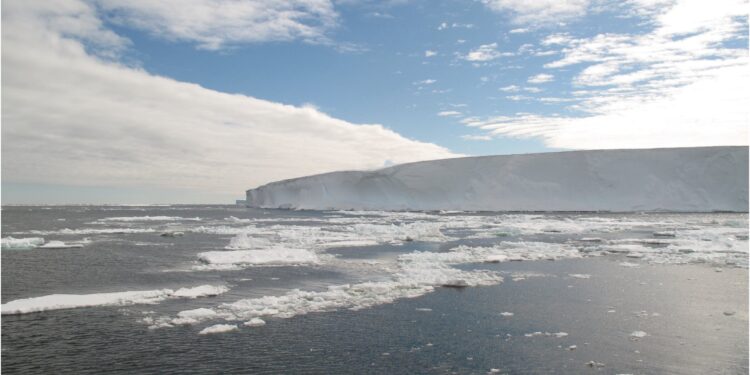An iceberg floats in the cold waters of Antarctica. Credit: Makoto Saito, Woods Hole Oceanographic Institution
Vitamin B12 deficiency in humans can cause many health problems and even become fatal. Until now, it was thought that these same deficiencies also affected certain types of algae. A new study examined the exposure of the algae Phaeocystis antarctica (P. antarctica) to a matrix of iron and vitamin B12. The results show that this alga has the ability to survive without B12, which computer analysis of genome sequences had erroneously indicated.
The algae, native to the Southern Ocean, is originally a single cell that can transform into colonies on a millimeter scale. The research published in Proceedings of the National Academy of Sciencestitled “Flexible B12 ecophysiology of Phaeocystis antarctica due to a B12-independent methionine synthase fusion with widespread homologs,” conducted by MIT, WHOI, the JC Venter Institute, and the Scripps Institution of Oceanography (UCSD), found that, Unlike other key polar phytoplankton, P. antarctica can survive with or without vitamin B12.
“Vitamin B12 is really important for the metabolism of algae and because it allows them to make a key amino acid more efficiently,” said Makoto Saito, one of the study co-authors and a senior scientist at the Woods Hole Oceanographic Institution (WHOI).
“When you can’t get vitamin B12, life has ways of producing these amino acids more slowly, which also slows their growth. In this case, there are two forms of the enzyme that produces the amino acid methionine , one requiring B12, and one that is much slower, but does not require B12. This means that P. antarctica has the ability to adapt and survive with low B12 availability.
The researchers arrived at their conclusions by studying P. antarctica proteins in a laboratory culture and also looking for key proteins in field samples. During their observation, they discovered that the algae possessed a B12-independent methionine synthase (MetE) fusion protein. The MetE gene is not new, but was previously thought not to be possessed by P. antarctica. MetE gives algae the flexibility to adapt to low vitamin B12 availability.
“This study suggests that the reality is more complex. For most algae, maintaining a flexible B12 metabolism is beneficial, given the scarcity of the vitamin’s supply in seawater.” said Deepa Rao, principal investigator of the study and former postdoctoral fellow at MIT. This flexibility allows them to make essential amino acids, even when they cannot obtain enough vitamins from the environment. Which implies that classifying algae as requiring vitamin B12 or not might be too simplistic.
P. antarctica, which lives at the base of the food web, is thought to be entirely controlled by iron nutrition. The discovery of the MetE gene also indicates that vitamin B12 likely plays a role. Due to its presence in P. antarctica, the alga’s adaptability gives it a potential advantage to flower in early austral spring, when B12-producing bacteria are rarer.
This discovery also has implications for climate change. The Southern Ocean, where P. antarctica is found, plays an important role in the terrestrial carbon cycle. P. antarctica absorbs CO2 and releases oxygen through photosynthesis.
Researchers conduct study on P. Antarctica aboard the R/V Palmer in the Ross Sea. Credit: Makoto Saito
“As our global climate warms, increasing amounts of iron are entering the coasts of the Southern Ocean due to melting glaciers,” Saito said. “It’s important to predict what the next limiting thing after iron will be, and B12 seems to be one of them. Climate modelers want to know how much algae is growing in the ocean in order to get correct predictions and they have parameterized iron, but I haven’t included B12 in these models yet.
“We are particularly interested in learning more about the extent of diversity in strain levels. It will be interesting to see whether B12-independent strains have a competitive advantage in a warmer Southern Ocean,” said co-author of the study Andy Allen, assistant professor. at the J. Craig Venter Institute and the Scripps Institution of Oceanography at the University of California, San Diego. “As B12 independence comes at a cost in terms of metabolic efficiency, an important question is whether or not strains that require B12 could become dependent on B12-producing bacteria.”
The finding that P. antarctica has the ability to adapt to minimal vitamin B12 availability proves true for many other algae species that were previously also considered strict users of vitamin B12. The results of this study will pave the way for future research related to the carbon cycle and how different types of algae survive in the cold and harsh environment of the Southern Ocean.
More information:
Deepa Rao et al, Flexible B 12 ecophysiology of Phaeocystis antarctica due to a B 12-independent methionine synthase fusion with widespread homologs, Proceedings of the National Academy of Sciences (2024). DOI: 10.1073/pnas.2204075121
Provided by Woods Hole Oceanographic Institution
Quote: Adaptability of vitamin B12 in Antarctic algae has implications for climate change and life in the Southern Ocean (February 5, 2024) retrieved February 6, 2024 from
This document is subject to copyright. Apart from fair use for private study or research purposes, no part may be reproduced without written permission. The content is provided for information only.



